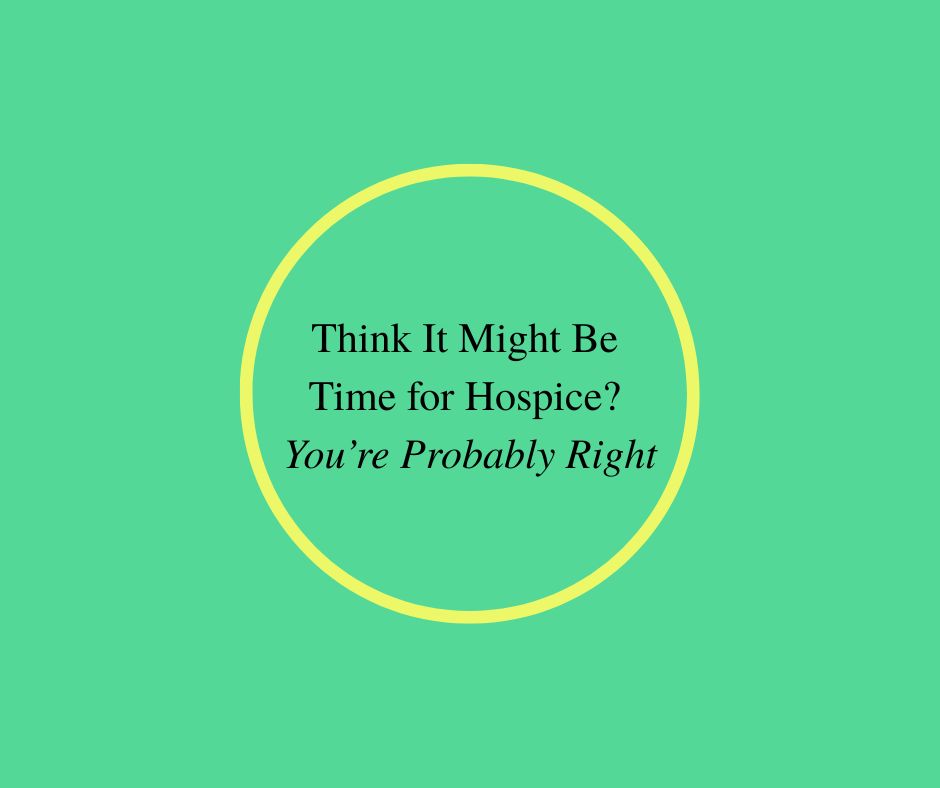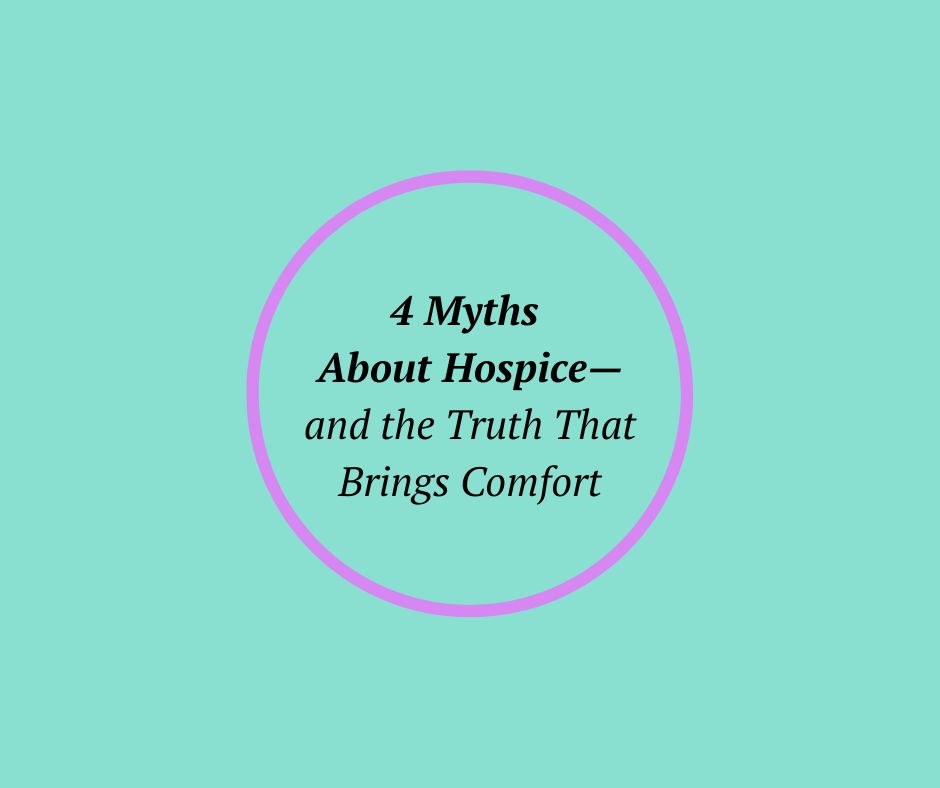On one of those 3:00 in the morning, "I can’t sleep so I'll think instead" nights it occurred to me that there are actually three kinds of diseases.
There are diseases that are fixable. You go to the doctor, receive medicines or treatments, and you become well. There is no question that you will get better.
Then there are diseases that are life-threatening. They may be fixable, OR maybe not be fixable. Treatment is not a guarantee that you will return to health.
And the final kind of disease is not fixable. No matter the treatments, no matter the care, death will be the result.
These three disease categories do not necessarily follow each other. They do not move into each other in a one, two, three progression. Each requires its own separate, unique approach to care. There are different treatment plans and services for each of these disease categories.
When a disease is fixable, home health services provide medical care in the home. It can provide instructions, observation, assessments, and monitoring when a person has challenges leaving their home to receive a physician’s care.
When it is questionable whether the disease can be fixed, home health is still an option. But palliative care becomes an appropriate shift in services. There is a shift from certainty to uncertainty. You will try to fix the disease, but there is an understanding that it may not work.
For the disease that can’t be fixed or cured, no matter what is done, hospice becomes the appropriate care provider. Hospice is end of life care and presents a shift from curative considerations to comfort, supportive care. Family support becomes an important part of care.
With the first two types of diseases, the patient is the point of care, the point of decision making. The patient is responsible for making all decisions. Family and significant others are not part of the plan of care.
With hospice services, the family and significant others are included as part of the decision making. They are as much a part of the plan of care as the patient.
Knowing and recognizing the three different types of disease gives us a better picture of the options available to us. It can help us make wise decisions as we travel the challenges of health care.
Something more… about From Cure to Comfort: Matching Your Care to the Illness
If you’re looking for guidance, the Family Support Bundle brings together my most helpful resources to prepare and support you from palliative care through end-of-life care. Whether you’re just starting to ask questions or already walking this path, this bundle offers comfort, education, and reassurance.








1 comment
Elsa Campbell
And then there is someone like me who has way out lived my life expectancy. I have multiple, serious medical problems, and yet don’t seem to fit any category. I have had T1 diabetes and Hashimoto’s thyroiditis since 1959. I went over 49 years with anemia which I eventually figured out was caused by Celiac disease. No doctor would pay attention because I was always told my symptoms were caused by long term diabetes. Since the 1980’s,.I have been legally blind due to having only 17 degrees of central vision caused by extensive laser treatments. I have severe autonomic neuropathy, peripheral neuropathy, labile blood pressure, chronic kidney disease. I have a differential diagnosis of multiple system atrophy which would qualify me for Hospice care but since I seem to be declining slower, probably all symptoms are caused by long term diabetes, so don’t qualify for anything. I could die tonight or I could live another 2 or 3 years. If I live until 2029 I will have been a diabetic for 70 years. No doctor has any experience with someone like me. Even with all these problems I took care of my husband for 3 years as he was dying from heart failure and chronic kidney disease. He had hospice for the last 10 months of his life. The stress of it all took a further toll on my health. He died in May of 2023 and finally hospice hired a Chaplin to give me support for the 13 months after he died. Then I caught COVID and my health further deteriorated. I have made it know that my end of life wishes are. If I have a heart attack, stroke, stage 4 kidney disease, or dementia and can no long care for myself, I want to be placed on hospice care and have my insulin stopped to shorten my suffering but can’t get any clear answers about this. It is well documented that assisted living facilities give dismal care to T1 diabetes so that’s not an option. I probably couldn’t afford it any way. I saw first hand all the mistakes made when my father died from T1 diabetes and Parkinson’s in an assisted living faciltiy. I would rather stop my insulin than go through what he went through. My daughter has power of attorny to follow my wishes but I don’t want her to get in a legal battle about stopping my insulin. I would prefer to use the Hospice team my husband had but they keep having turn over in staff. The only person left of team that I knew is the hospice Chaplin who does stay in touch with me. I brought several of your booklets before my husbands died which were helpful and I listen to your podcasts ever since but as you have stated hospice is not what it used to be. When I could no longer work full time because of my health problems, I became a hospice volunteer and eventually trained other volunteers in the 1980’s. Our organization never became a medicare hospice . It still exists on community donations. Unfortunately we had to move from California to be near my daughter in Arizona. Different laws here and it’s hard to get any clear cut answers. I pay for a concierge PCP so I’m getting better care than at first but she has a hard wanting me to give up hope. Like most doctors she’s reluctant to refer. Enough of my rambling. Quality medical care these day is dismal.
———
BK Books replied:
Elsa, What a challenging journey your life has been. May you find strength and guidance as your path unfolds. Blessings! Barbara
And then there is someone like me who has way out lived my life expectancy. I have multiple, serious medical problems, and yet don’t seem to fit any category. I have had T1 diabetes and Hashimoto’s thyroiditis since 1959. I went over 49 years with anemia which I eventually figured out was caused by Celiac disease. No doctor would pay attention because I was always told my symptoms were caused by long term diabetes. Since the 1980’s,.I have been legally blind due to having only 17 degrees of central vision caused by extensive laser treatments. I have severe autonomic neuropathy, peripheral neuropathy, labile blood pressure, chronic kidney disease. I have a differential diagnosis of multiple system atrophy which would qualify me for Hospice care but since I seem to be declining slower, probably all symptoms are caused by long term diabetes, so don’t qualify for anything. I could die tonight or I could live another 2 or 3 years. If I live until 2029 I will have been a diabetic for 70 years. No doctor has any experience with someone like me. Even with all these problems I took care of my husband for 3 years as he was dying from heart failure and chronic kidney disease. He had hospice for the last 10 months of his life. The stress of it all took a further toll on my health. He died in May of 2023 and finally hospice hired a Chaplin to give me support for the 13 months after he died. Then I caught COVID and my health further deteriorated. I have made it know that my end of life wishes are. If I have a heart attack, stroke, stage 4 kidney disease, or dementia and can no long care for myself, I want to be placed on hospice care and have my insulin stopped to shorten my suffering but can’t get any clear answers about this. It is well documented that assisted living facilities give dismal care to T1 diabetes so that’s not an option. I probably couldn’t afford it any way. I saw first hand all the mistakes made when my father died from T1 diabetes and Parkinson’s in an assisted living faciltiy. I would rather stop my insulin than go through what he went through. My daughter has power of attorny to follow my wishes but I don’t want her to get in a legal battle about stopping my insulin. I would prefer to use the Hospice team my husband had but they keep having turn over in staff. The only person left of team that I knew is the hospice Chaplin who does stay in touch with me. I brought several of your booklets before my husbands died which were helpful and I listen to your podcasts ever since but as you have stated hospice is not what it used to be. When I could no longer work full time because of my health problems, I became a hospice volunteer and eventually trained other volunteers in the 1980’s. Our organization never became a medicare hospice . It still exists on community donations. Unfortunately we had to move from California to be near my daughter in Arizona. Different laws here and it’s hard to get any clear cut answers. I pay for a concierge PCP so I’m getting better care than at first but she has a hard wanting me to give up hope. Like most doctors she’s reluctant to refer. Enough of my rambling. Quality medical care these day is dismal.
———
BK Books replied:
Elsa, What a challenging journey your life has been. May you find strength and guidance as your path unfolds. Blessings! Barbara